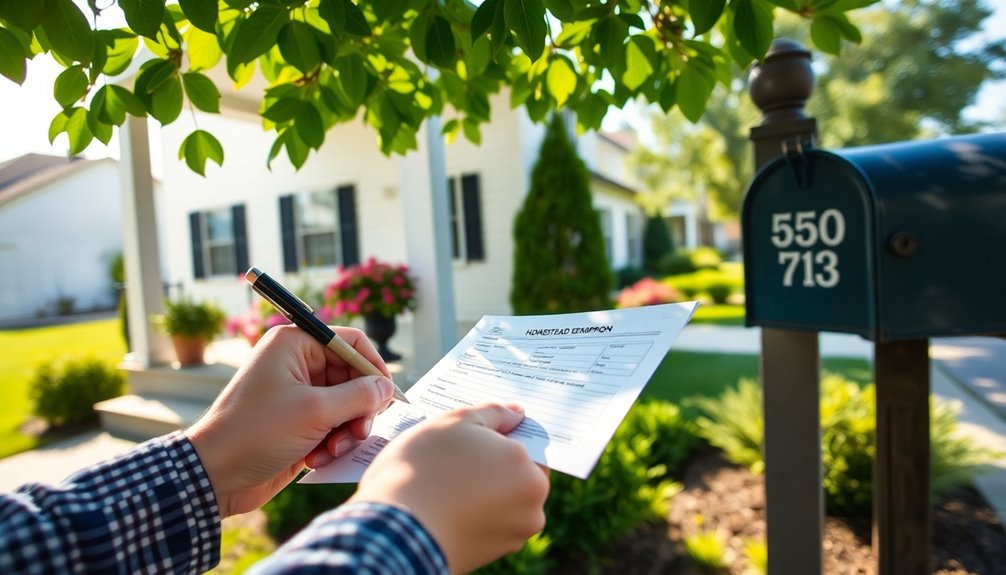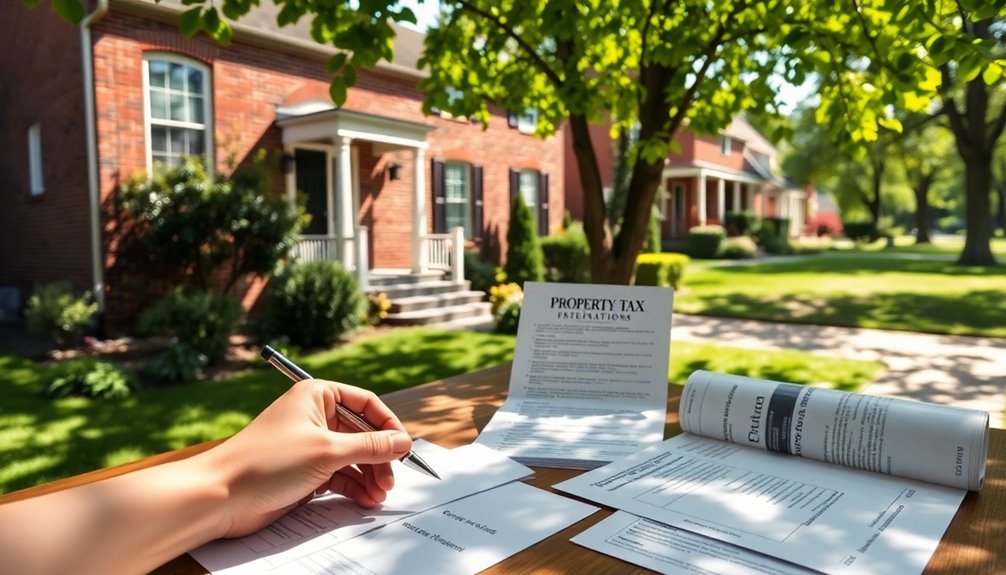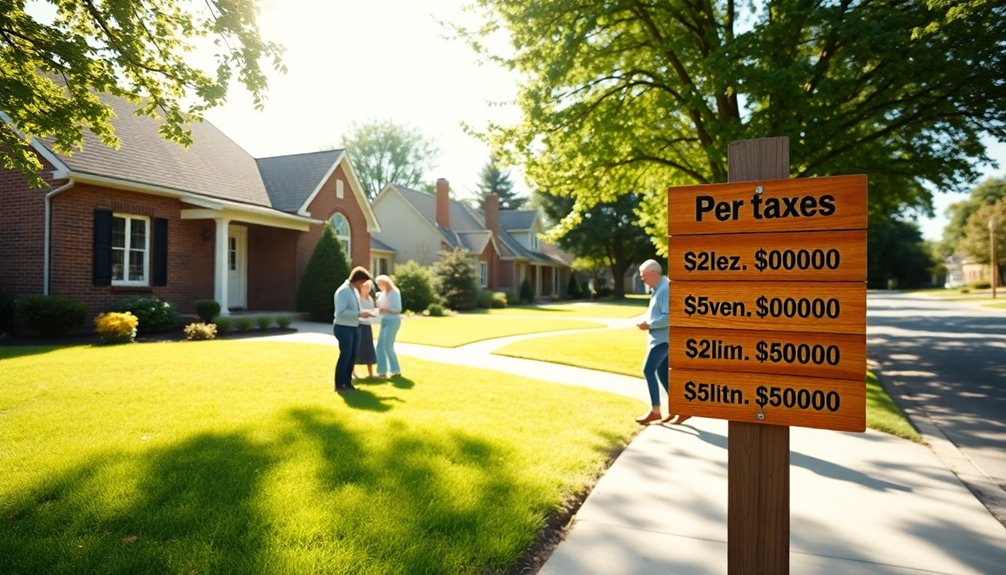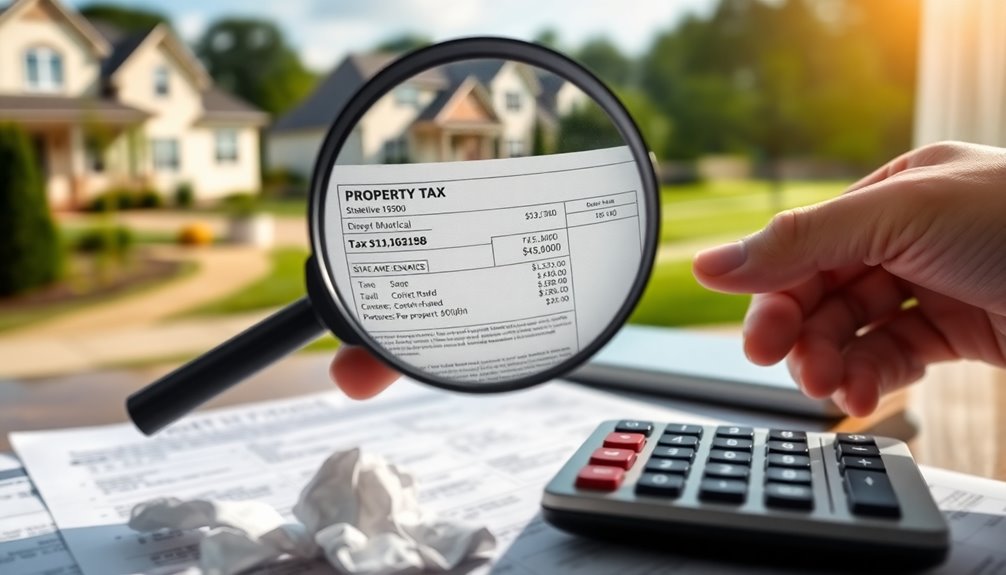You can lower your property taxes in Ohio by applying for the Homestead Exemption, which reduces your taxable value significantly. If you're a veteran with a 100% disability rating, there are enhanced benefits available too. Make sure to file your application using form DTE 105A and meet the income requirements, which can't exceed $36,100 for 2023. You should also consider appealing your property tax assessment if you believe your home's value is overestimated. Additionally, programs like tax deferral for seniors provide extra relief. There are plenty of strategies to explore further, so stay informed on your options.
Key Takeaways
- Apply for the Homestead Exemption to reduce your taxable property value if eligible due to age, disability, or as a surviving spouse of a first responder.
- Ensure your total household income does not exceed the limits ($36,100 for 2023; $38,600 for 2024) to qualify for the Homestead Exemption.
- Veterans with a 100% disability rating can receive significant tax reductions without income limits; apply by December 31 of the application year.
- Appeal your property tax assessment if you believe your home is overvalued; collect evidence to support your claim.
- Take advantage of property tax relief programs, such as the 10% rollback for owner-occupied homes and tax deferral options for seniors and disabled homeowners.
Understanding Homestead Exemption

Understanding Homestead Exemption can significantly impact your property tax bills in Ohio. This exemption offers financial relief, reducing the taxable value of your primary residence.
To qualify, you need to meet specific eligibility criteria, like being at least 65 years old or permanently disabled. Surviving spouses of first responders are also eligible, irrespective of income, while surviving spouses of previous exemption recipients must be at least 59 at the time of their spouse's death.
Your total household income mustn't exceed $36,100 for 2023, or $38,600 for 2024, but those who received the exemption before 2014 aren't subject to this limit. Additionally, the Ohio Homestead Exemption provides a significant reduction in the taxable property value, making it a crucial aspect of property tax management.
The exemption amount is substantial; it typically reduces your taxable property value by $26,200, or $52,300 if you're a disabled veteran or the spouse of a first responder.
This exemption only applies to your primary residence, where you're registered to vote. Remember, you can only claim one Homestead Exemption per property.
If your status doesn't change, you won't need to reapply. Utilizing this exemption can significantly lower your property tax burden, making it essential to understand your eligibility.
Application Process for Exemptions

To apply for the Homestead Exemption in Ohio, you'll need to gather specific documentation and complete the required application form, known as the "DTE 105A." This form is available through the Ohio Department of Taxation or your local county auditor's office.
Make sure to check with your county auditor for any specific requirements, as they may vary by county.
Along with the DTE 105A, you'll need to attach supporting documents. If you're a disabled applicant, include a disability status form from a state or federal agency or a Certificate of Disability certified by a physician or psychologist.
You must also provide proof of eligibility, such as age or disability documentation. In 2024, the exemption will provide a tax reduction on up to $26,200 of home value, benefiting eligible homeowners.
Submit your completed application to the county auditor's office between January 1st and December 31st of the year you're seeking the exemption. Ensure your application is received by December 31st to qualify.
If you missed last year's deadline, you can still apply and receive a reduction on last year's taxes. Current recipients don't need to reapply unless there's a change in your status.
For assistance, reach out to your county auditor's office.
Income Requirements Overview

Navigating the income requirements for the Homestead Exemption in Ohio is crucial for homeowners seeking tax relief. For 2023, your total household income mustn't exceed $36,100 per year, and for 2024, the limit increases to $38,600. This threshold is adjusted annually for inflation and includes the Ohio adjusted gross income of you and your spouse, along with all income sources, such as business income.
To qualify, you'll need to accurately report your income, as exceeding the limit disqualifies you from the exemption. Remember, even if you temporarily surpass the threshold, you lose the exemption entirely. It's important to note that Social Security payments are included in the income calculation, and there's no provision for partial exemptions.
If you've been enrolled in the program prior to tax year 2014, you can still benefit even if your current income exceeds the limit. Proposed legislation could potentially increase the income threshold to $75,000, allowing more homeowners to qualify. Additionally, the poorest 20% of homeowners in Ohio pay over three times the property tax share compared to the richest 1%, highlighting the need for enhanced tax relief options.
Keep an eye on these changes as they may expand your eligibility for tax relief.
Enhanced Exemptions for Veterans

Homeowners in Ohio can also benefit from enhanced exemptions specifically designed for veterans with 100% disability ratings. If you've received a 100% disability rating from the VA or compensation due to individual unemployability from service-connected disabilities, you may qualify for significant tax relief.
To be eligible, you must have been honorably discharged and own your home as your primary residence as of January 1 of the application year. Additionally, no income requirements are established under this program, making it accessible to more veterans.
The exemption reduces the taxable value of your property by $50,000, effectively lowering your property taxes. For instance, if your home is valued at $150,000, you'd only be taxed on $100,000.
To apply, gather necessary documents, including a letter from the VA confirming your disability rating, your DD214 discharge papers, and relevant award letters.
You can apply until December 31st of the year you're applying for. If you're already receiving the Homestead Exemption, you won't need to reapply unless your status changes.
Contact your county Auditor or visit their website to obtain forms and further information. Taking advantage of this exemption can lead to substantial savings on your property taxes.
Additional Tax Reduction Strategies

Exploring various avenues for reducing property taxes in Ohio can lead to significant savings. One effective strategy is to appeal your property tax assessment if you believe your home is overvalued. Gather evidence, like appraisals or comparisons with similar homes, and file your appeal within the county's designated timeframe. A successful appeal could lower your taxable value and reduce your property taxes.
You should also take advantage of property tax relief programs. For instance, the 10% rollback for owner-occupied homes is automatically applied to your tax bill. Seniors and disabled homeowners can benefit from the Tax Deferral Program, deferring property taxes until the home is sold. Additionally, consider applying for the increased per-dwelling tax credit which has been raised to $100,000, potentially providing further financial relief.
Don't forget about tax exemptions like the Homestead Exemption, which reduces your taxable value by $25,000 if you qualify.
Also, consider the Current Agricultural Use Value (CAUV) program if your property is used for agriculture.
Finally, regularly review your property assessment for clerical errors and ensure correct classification to avoid unnecessary taxes. Staying informed about available credits and changes in tax laws can help you maximize your savings.
Frequently Asked Questions
Can I Apply for Multiple Tax Exemptions Simultaneously?
You can't typically apply for multiple tax exemptions on the same property at once due to the single exemption rule.
However, if you get written consent from the appropriate municipal or county entity, you might be able to combine certain exemptions.
Just make sure to check with your county Auditor's Office for specifics and ensure your application meets all the necessary requirements for any exemptions you're interested in pursuing.
How Often Can Property Tax Rates Change in Ohio?
Property tax rates in Ohio can change annually, primarily during the triennial updates and general reappraisals.
Each county undergoes a full reappraisal every six years, and in between, they adjust values every three years.
However, adjustments ensure that despite property value changes, the overall tax revenue remains stable.
This means tax rates mightn't change significantly, even if property values fluctuate.
Stay informed about your county's schedule to understand potential changes.
What Documents Are Needed for Property Tax Appeals?
To appeal your property taxes, you'll need several key documents.
Start with a recent appraisal report and comparable sales data to support your claim.
Include evidence of any property damage, such as photographs or repair estimates.
Recent sale agreements and detailed income statements can strengthen your case, especially for commercial properties.
Lastly, gather any construction costs or certified estimates that back your valuation argument.
These documents will help you effectively present your appeal.
Are There Deadlines for Challenging Property Assessments?
Yes, there are deadlines for challenging property assessments.
In Ohio, you need to file your complaint with the local Board of Revision by March 31st. Missing this deadline means you lose your chance to contest the current year's valuation.
It's crucial for both residential and commercial property owners. Make sure you gather your reasons and any necessary documentation before this date to ensure your challenge is valid and timely.
How Can I Find My Local Tax Auditor's Contact Information?
To find your local tax auditor's contact information, start by visiting your county auditor's official website.
Look for the "Contact" or "About Us" section, where you'll typically find the office address and phone numbers.
If you don't see it there, check your local government's website for relevant details.
You can also reach out to the Ohio Auditor of State's office for assistance in locating your local auditor's contact info.
Conclusion
By understanding the Homestead Exemption and its application process, you can take significant steps to lower your property taxes in Ohio. Don't forget to check your income against the requirements and explore enhanced exemptions for veterans if applicable. Additionally, consider other tax reduction strategies to maximize your savings. With a bit of effort and the right information, you can effectively reduce your property tax burden, making homeownership more affordable.









